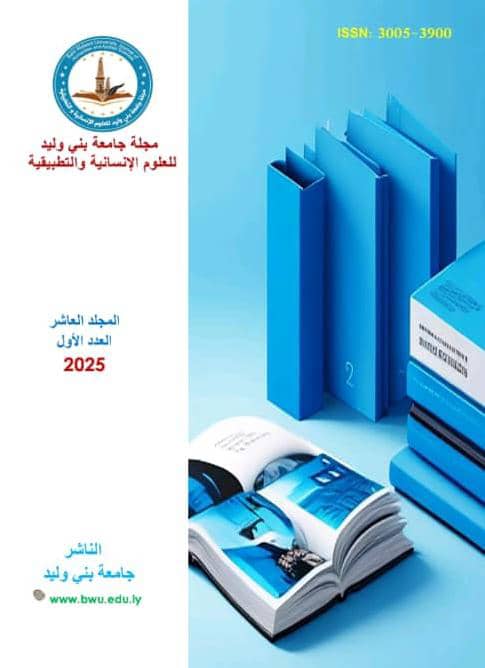The role of civil society institutions in developing health awareness for people with special needs in light of the Corona pandemic" from the point of view of teachers and administrators Field study on the Ahbab Allah School for the Special Needs in Sirte
DOI:
https://doi.org/10.58916/jhas.v10i1.681Keywords:
civil society , Corona virus, special needs, health awarenessAbstract
The current study aims to identify the mechanisms of work of civil society institutions in confronting the Corona pandemic for people with special needs, as well as knowing the strategies used by civil society institutions to develop health awareness in confronting the Corona pandemic from the point of view of administrators and teachers in schools with special needs Given the nature of the study, represented in the role of civil society institutions in developing health awareness for people with special needs in light of the Corona pandemic, and because of its importance in collecting data and facts from reality, the descriptive analytical approach was followed in this study, and the social survey approach was adopted using the intentional random sample. The data of the study was collected through a questionnaire prepared by the researcher as a main tool of social research in order to obtain the necessary information. The sample size was determined and its size was (30 individuals from administrators and teachers with special needs).
The most important results are: 57.7% of the respondents believe that civil society organizations are not keen to publish infection and death statistics and the location of the spread of the virus. It also found that 88.6% of the respondents believe that the awareness programs provided by civil society organizations for people with special needs lead to feelings of With satisfaction from the point of view of the teachers, 91% of the respondents showed that civil society institutions provide training courses and workshops for teachers with special needs on how to combat the Corona virus.
Downloads
References
Ahmed Zaki Badawi: Dictionary of Social Sciences Terms, Lebanon Library, Beirut, 1993, p. 359.
www.almaany.com on the Internet.
Muhammad Al-Ghailani: Civil Society Grant, Paradoxes of Function and Stakes of Independence, Point of View Notebook, 1st ed., New Success Printing Press, Casablanca, Morocco, 2005, p. 49.
Baha Al-Din Salama: Health and Health Education, Dar Al-Fikr Al-Arabi, Cairo, 2007, p. 127.
Abdulmalik Abdulaziz: Effective Communication Practices in Managing the Corona Crisis and Building Health Awareness among Saudi Society Members, Arab Journal of Media and Communication Research, Issue 3 2020, p. 124.
Ahmed Abdel-Maqsoud: The Reality of Social Responsibility of Universities in Dealing with Students with Special Needs, Journal of Studies in Social Service and Human Sciences, Issue 52, Volume 1 2020, p. 49.
Nizar Nassar: The role of civil society institutions in social development, an exploratory study at Al-Wasat University, Al-Arak Journal of Philosophy, Linguistics and Sciences, Issue 16, Year 6, 2014, p. 3.
Amani Qandil: The development of civil society in Egypt, Alam Al-Fikr, Volume 27, Issue 3, 1999, p. 100.
Ibrahim Ghalioun: Civil Society and the Problem of Democratic Transformation, Documentation and Human Studies Center, Qatar University, January 16, 2001, p. 4.
Mabrouk Al-Sahli: The Role of Civil Society in Combating the Corona Pandemic (Covid 19), Al-Haqiqa Journal of Social and Human Sciences, Volume 19, Issue 4, 2020, p. 142.
Abdul Rahman Othman and others: The Role of Civil Society Organizations in Supporting Social Welfare Services in Omani Society (Necessities and Requirements), Journal of Arts and Social Sciences, Sultan Qaboos University, 2012, p. 74.
Muhammad Rajab Tarish: Civil Society in Libya, Libyan Forum Publications, Tripoli, 2010, p. 8.
Muhammad Abdul Qader Abu Al-Qasim: The Role of Civil Society Organizations in the Electoral Process in Libya after 2011, Unpublished Master's Thesis, Suez Canal University, Department of Political Science, Faculty of Commerce, 2015, p. 54.
Prepared by a group of students: The role of civil society institutions in supporting national belonging, Faculty of Arts and Sciences, University of Benghazi, unpublished research, 2014, p. 72.
Muhammad Al-Manfi: Omar Al-Mukhtar Association, Libya Today Newspaper, Issue 10, First Year, 1945, p. 12.
The same previous reference: p. 15.
Article No. (1) of the statute of the Wa’atasmu Association, established according to General People’s Committee Resolution No. 1008 of 2002.
Walid Al-Salihi and others: Civil society, reality, challenges, conditions and needs of civil society organizations in Libya, a field study by the Future Foundation, Tripoli, 2012, p. 10.
Abdul Nasser Zamit: The role of civil society institutions in Libya, on the page of the Libyan Association for Women Prisoners, Tripoli, 2012.
Baha El-Din Ibrahim Salama: Health and Health Education, Dar Al-Fikr Al-Arabi, Cairo, first edition, 1997, p. 127.
Abdel Halim Khalfi: The impact of health control on the level of health awareness among students of the Ben Matghasht University Center, Journal of Humanities and Social Sciences, Issue 13, 269-2003, p. 273.
Othman Al-Arabi: Media, the social cultural construction of the Arab citizen, a research presented to the thirteenth annual scientific conference, Faculty of Media, Cairo University, 2007, p. 651.
Mahjoub Attia Al-Faidi: Scientific research methods in the social sciences, Omar Al-Mukhtar University, Al-Bayda, 1994, p. 82.
Abdullah Al-Hamali: Social research method and techniques, University of Garyounis, Benghazi, 1988, p. 119.
Mustafa Omar Al-Tir: Introduction to the Principles and Foundations of Social Research, Al-Sha’biya Publishing and Distribution House, Tripoli, Libya, no date, p. 62.













